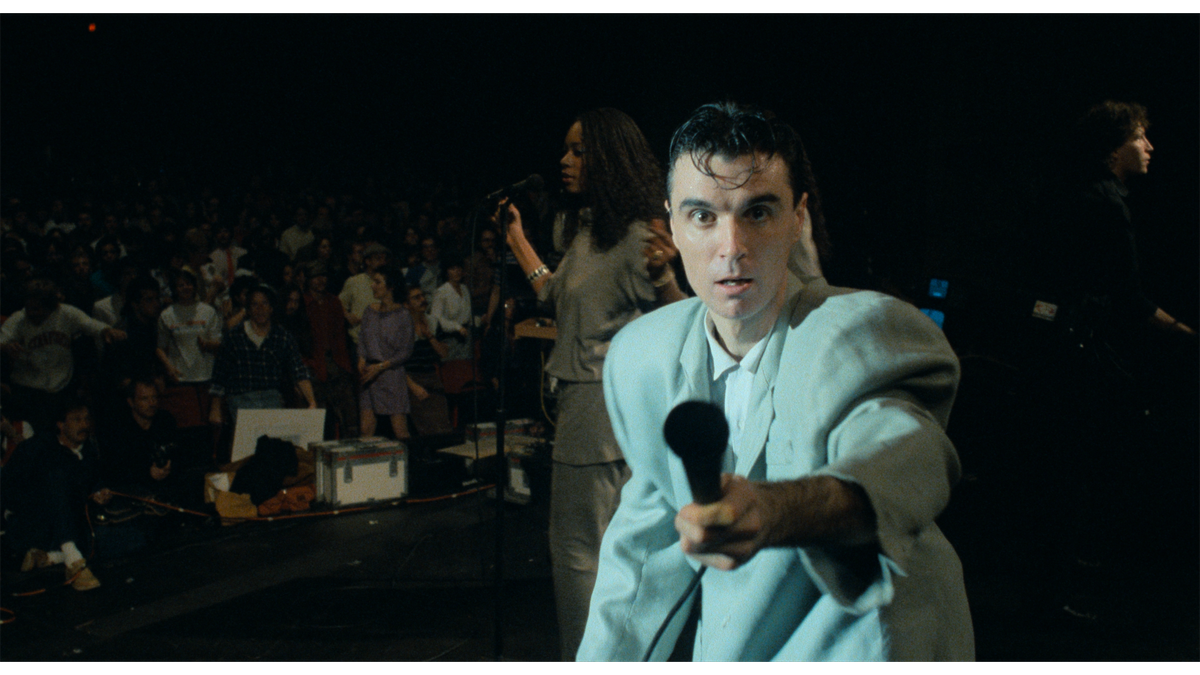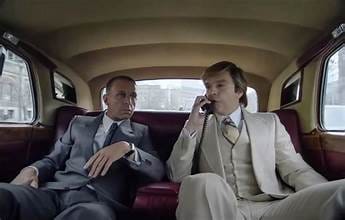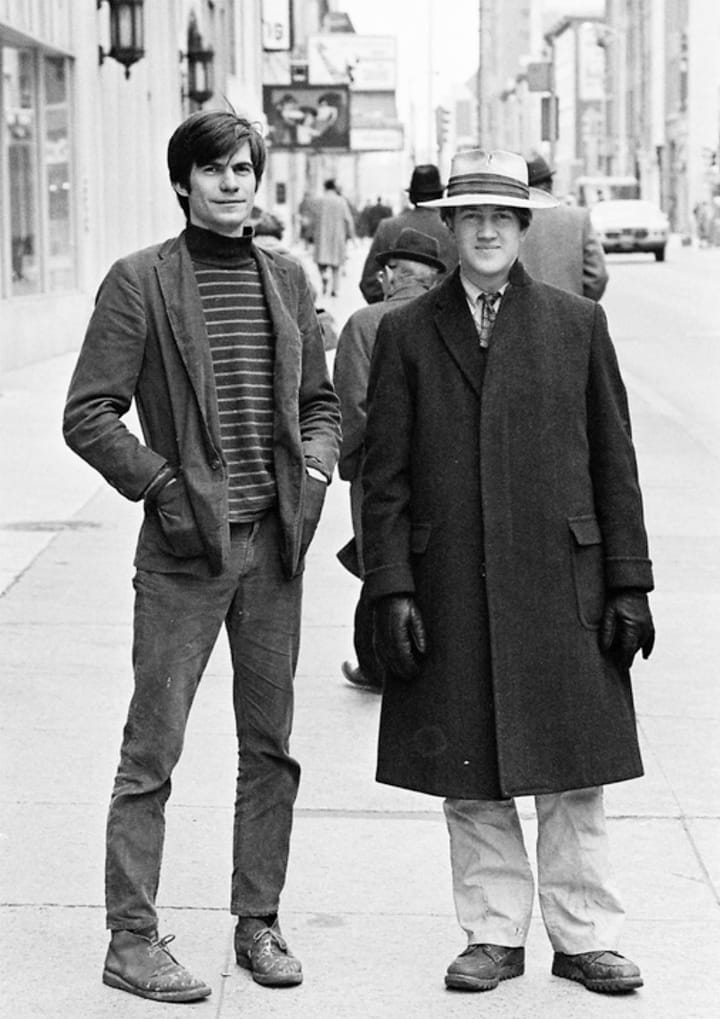Never Stop "Stop Making Sense"

We'll always miss Jonathan Demme, but his great concert film lives on
“No rock moves or poses,” wrote David Byrne of the founding principles of Talking Heads when the band set out in 1975, “no pomp or drama, no rock hair, no rock lights, no rehearsed stage patter.” As he added in his 2012 book of linked essays, How Music Works, "Those tropes were already taken.” The then-quartet's members were products of the Rhode Island School of Design, a century-old hipster perennial that truly came to the fore in the 1960s as rock and art collided.
Their first landmark gig was opening at CBGB's for the Ramones, whose dictum against guitar solos they shared. Byrne was the weirdly energized front man, and his very posture and almost incel-like, straight-arrow bearing—as twitchy and Aspergery a stage presence as I was in those days”--communicated the irony that was plain to hear in their name.
Of course the referenced talking heads of network TV—which is what they’d grown up with (Byrne was born in in Scotland in 1953)—were mostly feeding us pap, along with delivering the threatening news of nuclear warfare and the Vietnam war, while chronicling the already diminishing returns of Sixties activism.
The debut single that came in. 1977. “Love -} Building On Fire” was quietly astonishing—the twittering bird calls behind the opening chords, the pealing Byrne vocal, the gently pounding beat as the song builds to horn choruses that might have come from Stax-Volt tracks, then the horse-whipping bridge– all encased in a momentum that dared you to stop listening, and then suddenly—ended justlikehat.
Of course it was “Psycho Killer” that sealed the deal; for me, every time Byrne, inhabiting the persona of the title, instructed the subject to “Run, run run away,” I pictured a Mohawk'ed Robert DeNiro sprinting across Columbus Circle in “Taxi Driver,” which had come out the previous year.
The band pushed forth as a singular brand of pop sensation—artsy to be sure, a bit obscure in some references, but also unfolding accessibly sung tales of the eternal touchstones—mommy, daddy, love, buildings, food. Well after the band had broken up—in a series of sullen encounters between Byrne and the Chris Frantz/Tina Weymouth axis—the were still the epitome of post-punk listenability, , appropriate for everything from dorm-room nostalgia to backyard keggers. (One time in the mid-90s I met with a cohort of fellow boomers for three days of hiking out of a Vermont retreat, and though the sole, tinny speakers in the house belonged to a battered boombox, everyone was content with endless replays of a certain CD that roamed the world in my knapsack for years—a “Best of” Heads compilation.
The saga of how “Stop Making Sense” was re-worked in 2023 into an all-embracing compilation DVD (with the original film negatives almost magically found, as were certain revived audio tracks), is a small tech triumph. The A24 film studio smarties prepped it all (along with bales of newly minted merch), and premiered the new restoration in September, 2023, at the Toronto International Film Festival. The fond reception was followed by a Q&A hosted by Spike Lee with Byrne, Weymouth, Frantz and Jerry Harrison—mostly looking none too giddy to be reunited for the first time since their induction into the Rock and Roll Hall of Fame in 2002.
Also dropping for sale was a remaster of the soundtrack, and in January of this year, A24 announced a tribute album, “Everyone’s Getting Involved” --out today, May 17. The album features 16 bands and artists, including the National (and their sturdy reading of the lovely “Heaven”), Paramore, Lorde, and more, covering the film’s setlist in order.
“Heaven,” to these ears the band’s most underrated classic, is here with apologies for the kludgy resolution:
https://www.youtube.com/watch?v=EV412baN4yk
And, with respect to Miley Cyrus for her many cross-genre talents, I’ll skip the big-swing Miley try at retooling “Psycho Killer,” in favor of the film’s original:
https://www.youtube.com/watch?v=wke3tdWrd3k
It was a few days before th 1984 release of that original film that I asked for a sneak look, and came out of the Brill Builidng burbling—could Rolling Stone run a review in an issue that would crack open the embargo date? The result is here:
Talking Heads: "Stop Making Sense": Heads play from heart in new film
Fred Schruers, Rolling Stone, 25 October 1984
THE TITLE of this movie, filmed during a 1983 Talking Heads tour, is from a verse of the band's recent song 'Girlfriend Is Better': "As we get older and stop making sense/You won't find her waiting long." What the girlfriend gives the singer in David Byrne's song is "surprise," and this energetic concert film, which is choreographed, lit, staged and shot with bracing ingenuity, is full of just that. Byrne has gradually developed the capacity to write love songs and has replaced much of his dangerous side with (still) wacky but warm and showmanlike zest. He's singing from the heart, and this expanded lineup of Talking Heads is playing, to put it crudely, from the crotch. The result is steady, visceral excitement that somehow doesn't sacrifice the more cerebral aspects of the band's approach. If there is to be an apocalypse, then the Talking Heads of Stop Making Sense seem ready to smile and, dare we say, boogie through it.
Some of the best news about this movie is its avoidance of clichés. The ritual of backstage and "behind the scenes" that frames so many concert films is dispensed with, and after the coy opening shots of Byrne's feet padding into view, and a loopy little dance sequence he aims at a camera in the wings, the film is straightforward — presented from the audience's point of view, with just one brief foray into the crowd to show its reaction. Director Jonathan Demme (whose films include Melvin and Howard and Swing Shift) deployed six fixed cameras, one hand-held unit and one for long, fluid pans, but he eschews the head-jerking effect of frequent cutting. If Demme is showing us Bernie Worrell's otherworldly antics over the keyboards, he gives us a good long look. These nine excellent players are an attractive crew, and Demme lets his lens be seduced by each in turn.
There's eloquent simplicity in the structure of the show. Byrne begins the show alone (with acoustic guitar and a taped rhythm track, making 'Psycho Killer' fresh through sheer inventiveness). He is joined by Tina Weymouth on bass (and by the offstage harmony of Lynn Mabry in a breathtaking version of 'Heaven'), then by Jerry Harrison, Chris Frantz and the rest of the band, as the music gets more fiery and polyrhythmic. There's considerable artifice, as gorgeously effective lighting schemes alternate with slides of such things as dogs' paws and buzzwords in block letters, and the band's relentless exuberance sometimes creates a showbizzy feel. But overall, this movie does great credit to an important band, and moments like Byrne's possessed, zigzagging dogtrot around the stage during 'Life During Wartime' — so wonderfully funny and scary at the same time — make this the most innovative and captivating concert film in a long while.
#
After that, Mr. Demme (whose demise came far too soon, in April 2017) had trouble shaking off my avid attention—whether for his virtuous Haiti docs, "Philadelphia," or a set visit to Hannibal Lecter's prison cell in “Silence of the Lambs.” In 1989 Rolling Stone let me profile him as “Married To the Mob” was coming out (apologies for a paywall; the piece ran at 4600 words):
A snippet: “He delivers everything with a large dose of sugar,” says frequent collaborator David Byrne. “Then he slips in whatever criticism or whatever might be more unpleasant. His enthusiasm is really contagious.”
I would be remiss not to cite indie filmmaking pathfinder Roger Corman, who passed this week. He gave Demme his start with 1971’s “Angels Hard As They Come,” loosely based on Kurosawa’s “Rashomon.” The B pic with ideas took a scolding from Variety for its “violence, gutter language and sex,” but made Demme a favored Corman protégé: “I’ve always been impressed with the vitality Jonathan brings to his work. There’s an honesty, and he seems to very much understand American mores in the second half of the 20th Century.”
Perhaps the proper kicker for this testament to the talented and lovable Demme is the closing paragraph of the 1989 article, in which Byrne cites Demme’s “enthusiasm and affection… I’m by nature less outwardly enthusiastic, and it’s nice for me to catch a little bit of that from Jonathan, a a little bit of that rubs off – I really appreciate that.”





Comments ()